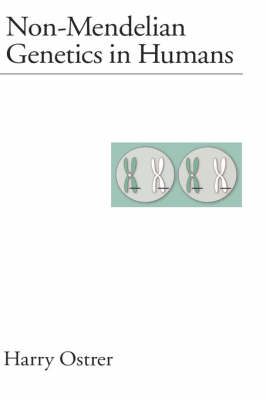
Non-Mendelian Genetics in Humans
Seiten
1998
Oxford University Press Inc (Verlag)
978-0-19-506877-1 (ISBN)
Oxford University Press Inc (Verlag)
978-0-19-506877-1 (ISBN)
Rediscovered at the turn of the century, Mendel's laws were found to be applicable to humans but were fraught with problems. This text shows how some of these problems can be explained by incomplete ascertainment, typing errors and modifying genes, and goes on to explore newer genetic processes.
When rediscovered at the turn of the century, Mendel's laws were found to be applicable to humans, but from the beginning they were fraught with problems. Sex-linked traits and linked genes defied Mendel's rules. Later, other exceptions were found, including sporadic cases, non-penetrance, variable expressivity, and preferential parental transmission.
In this book, Harry Ostrer observes that some of these problems can be explained by incomplete ascertainment, typing errors and modifying genes. He then goes on to systematically explore the evidence for a number of newer genetic processes that were not foreseen by Mendel and his intellectual heirs, examining the molecular basis for these processes and their effects on transmission and phenotype. He shows that these non-Mendelian processes--gonadal and somatic mosaicism, sex-linked inheritance, mitochondrial transmission, genomic imprinting, accelerated rates of mutation, and viral infection--resolve many of the exceptions to Mendelian inheritance. He also provides a complete review of Mendelian genetics, as well as an overview of the structure and functions of genes, chromosomes, and their products. Thus the book presents a holistic view of human genetics.
In the last chapter, Ostrer grapples with the possibilities for identifying new genetic processes, and with genetic determinism--the view that a person's phenotype is fully subject to his or her genetic constitution. He contends that despite the large number of genetic combinations, phenotypes cannot be predicted precisely, even with sufficient computing power. Genetic processes are frequently modified by environmental exposure or they may be random or stochastic in their occurrence. Hence, there are innate limits to genetic determinism. Although prediction of phenotype based on genotype will improve in the future as all of the human genes are identified, such predictions will always remain imprecise.
When rediscovered at the turn of the century, Mendel's laws were found to be applicable to humans, but from the beginning they were fraught with problems. Sex-linked traits and linked genes defied Mendel's rules. Later, other exceptions were found, including sporadic cases, non-penetrance, variable expressivity, and preferential parental transmission.
In this book, Harry Ostrer observes that some of these problems can be explained by incomplete ascertainment, typing errors and modifying genes. He then goes on to systematically explore the evidence for a number of newer genetic processes that were not foreseen by Mendel and his intellectual heirs, examining the molecular basis for these processes and their effects on transmission and phenotype. He shows that these non-Mendelian processes--gonadal and somatic mosaicism, sex-linked inheritance, mitochondrial transmission, genomic imprinting, accelerated rates of mutation, and viral infection--resolve many of the exceptions to Mendelian inheritance. He also provides a complete review of Mendelian genetics, as well as an overview of the structure and functions of genes, chromosomes, and their products. Thus the book presents a holistic view of human genetics.
In the last chapter, Ostrer grapples with the possibilities for identifying new genetic processes, and with genetic determinism--the view that a person's phenotype is fully subject to his or her genetic constitution. He contends that despite the large number of genetic combinations, phenotypes cannot be predicted precisely, even with sufficient computing power. Genetic processes are frequently modified by environmental exposure or they may be random or stochastic in their occurrence. Hence, there are innate limits to genetic determinism. Although prediction of phenotype based on genotype will improve in the future as all of the human genes are identified, such predictions will always remain imprecise.
Harry Ostrer, M.D., is Associate Professor of Pediatrics and Pathology and Director of the Human Genetics Program at New York University Medical Center. His current research is concentrated in the areas of genetic control of male sexual development, the genetic basis of cancer susceptibility, human population genetics, and assuring fairness in the use of genetic information.
1. Mendelian Inheritance in Humans ; 2. The Molecular Basis of Mendelian Disease ; 3. Deviations from the Mendelian Paradigm ; 4. Chromosomal Transmission ; 5. Sex Chromosome Transmission ; 6. Mitochondrial Inheritance ; 7. Genomic Imprinting ; 8. Accelerated Rates of Mutation ; 9. Viral Infection ; 10. Human Variation: Determinism or Chance
| Erscheint lt. Verlag | 1.5.1998 |
|---|---|
| Reihe/Serie | Oxford Monographs on Medical Genetics ; 35 |
| Zusatzinfo | line figures |
| Verlagsort | New York |
| Sprache | englisch |
| Maße | 160 x 229 mm |
| Gewicht | 544 g |
| Themenwelt | Studium ► 1. Studienabschnitt (Vorklinik) ► Histologie / Embryologie |
| Studium ► 2. Studienabschnitt (Klinik) ► Humangenetik | |
| ISBN-10 | 0-19-506877-7 / 0195068777 |
| ISBN-13 | 978-0-19-506877-1 / 9780195068771 |
| Zustand | Neuware |
| Haben Sie eine Frage zum Produkt? |
Mehr entdecken
aus dem Bereich
aus dem Bereich
Zytologie, Histologie und mikroskopische Anatomie
Buch | Hardcover (2022)
Urban & Fischer in Elsevier (Verlag)
CHF 75,60
Gewebelehre, Organlehre
Buch | Spiralbindung (2024)
Urban & Fischer in Elsevier (Verlag)
CHF 34,95


